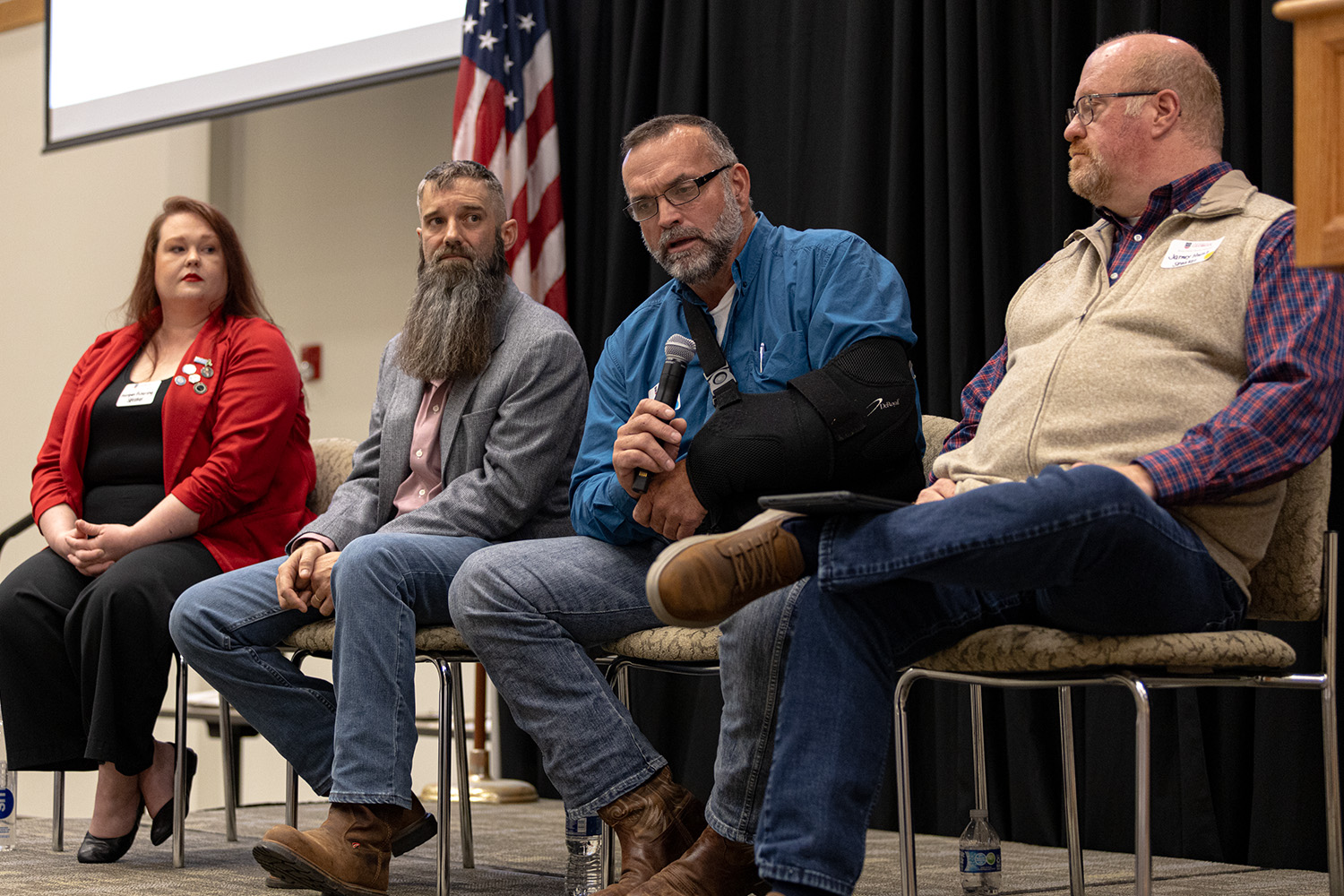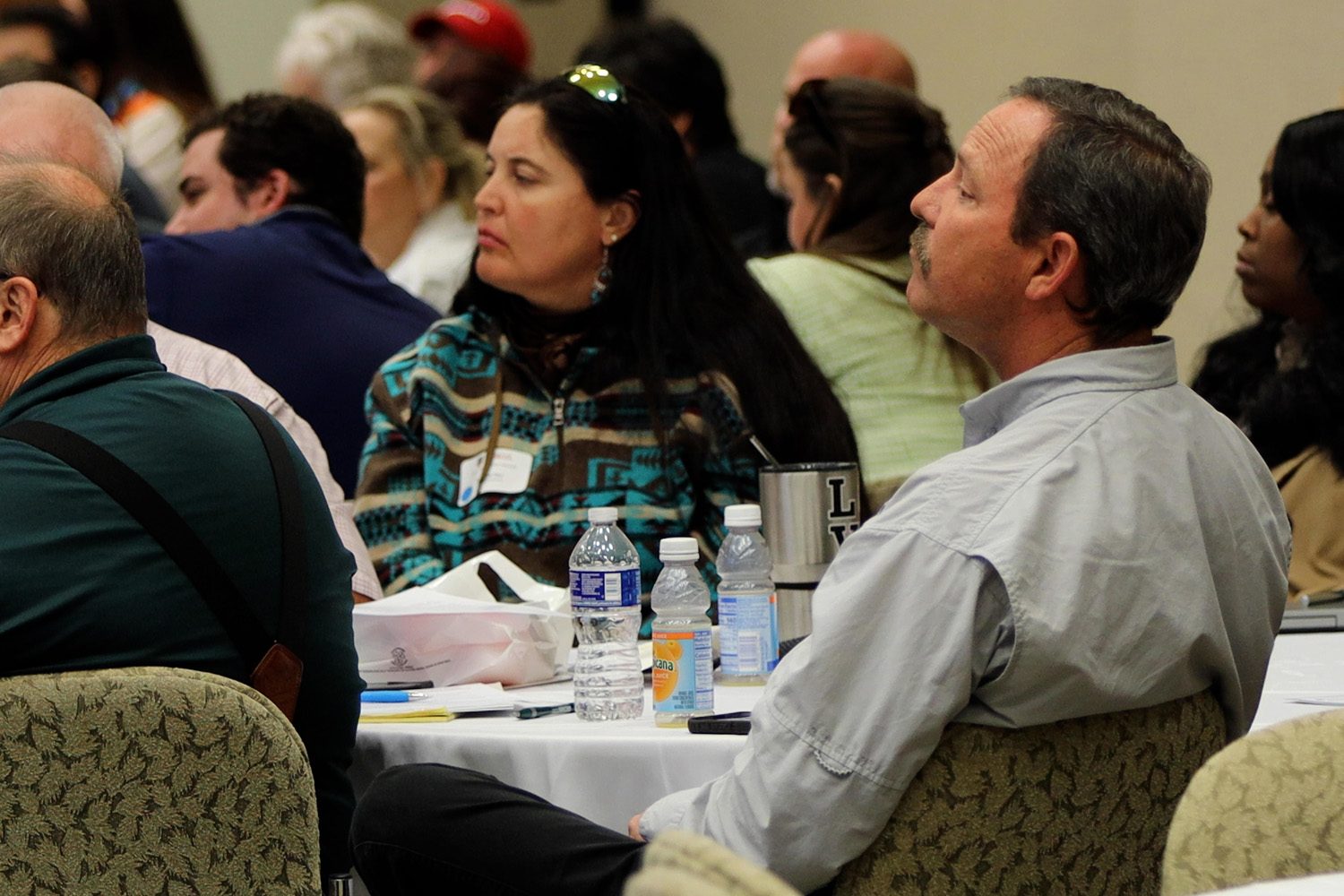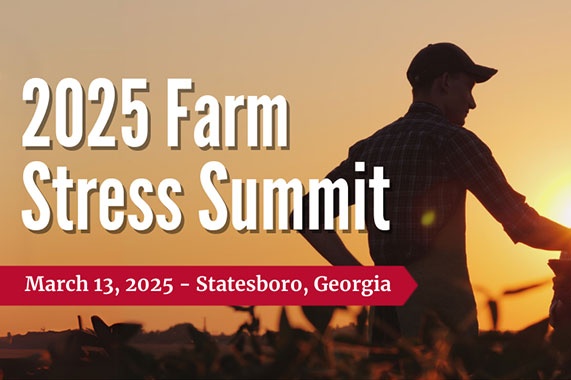
This story discusses mental health and suicide. If you need help, or know someone who does, call or text the Suicide and Crisis Lifeline at 988. Help is available 24/7 toll free and staffed by licensed mental health professionals.
As Georgia’s No. 1 industry, agriculture pumps billions of dollars into the state’s economy each year. While headlines often highlight Georgia’s commodities — peanuts, blueberries, poultry and more — one aspect of agriculture is often not discussed, the farmers themselves.
At the 2024 Farm Stress Summit, held at the Chattahoochee Technical College Jasper campus, a few critical points were woven throughout each of the day’s sessions: The people are the most important part of Georgia’s agricultural industry, and the state needs to come together to help farmers and promote agricultural education and awareness.
“There’s not a more important topic on my mind than this, and today, there’s not a more important place for me to be,” said Mark McCann, assistant dean for University of Georgia Cooperative Extension, during his welcoming remarks. “The people are the most important part of Georgia agriculture — they are what makes it significant, important and unique.”
Ending the “sting of stigma”
Jennifer Dunn connects with thousands of farmers each year, both in her prior role as a UGA Extension rural health agent and her current appointment as deputy assistant commissioner with the Georgia Department of Behavioral Health and Developmental Disabilities (DBHDD).
In a synopsis of her observations across the state, Dunn shared the three people Georgia’s farmers routinely trust when it comes to discussing stress: their spouses, their faith leaders and other farmers.
“There is a sting of stigma,” Dunn said. “It is very hard to have these conversations.”
Kevin Tanner, commissioner of DBHDD and keynote speaker at the event, wove his personal story — his family has farmed in Georgia since the Revolutionary War — into a single message.
“This is a crisis, and something we need to not be afraid to talk about,” Tanner said.
There has been a 66% increase in the number of Georgians who have died by suicide in the 20 years leading up to 2020, according to Tanner.
“You can get up every single day and do the very best job you can possibly do, but all it takes is one disease and your crop or flock is taken out and there’s just nothing you can do,” he said. “Generational farms have an added burden — you don’t want to be the generation that lets your family down.”
Tanner stressed the importance of 988, the Suicide and Crisis Lifeline. Help is available 24/7 and is staffed by mental health professionals, including a mobile dispatch unit that can meet someone in crisis at their location. A separate “farm life stress” section provides special resources for the state’s farming and agricultural community. The service receives approximately 20,000 calls and texts from the state of Georgia each month.

Building trust and connecting resources
A panel session, moderated by Allisen Penn, associate dean for Extension and outreach in the UGA College of Family and Consumer Sciences (FACS), brought together farmers and service leaders to discuss how the groups can work together to ensure producers are not falling through the gaps.
Justin Miller, military veteran agricultural coordinator in FACS; Matt Berry, owner of CB Farms; Jamey Hunt, cattle farmer and pastor of Sonoraville Baptist Church; and Morgan Pickering, community EMT in Pickens County, shared the most important steps communities can take to support farmers and rural residents.
Building trust, increasing communication and adding resources — including agricultural education and sharing the nobility of careers in agriculture — were included in nearly every answer.
Responding to a question posed by a county Extension agent, Berry ended by sharing a reminder for all Extension agents.
“Do not underestimate your credibility in our lives already,” Berry said to the agent. “You are very well trusted. Coming to us and being seen in our lives is another way to get to know us. You’ll be able to see when we’re out of sorts — even call us out when you need to.”
Looking for clues and asking difficult questions
After a video greeting from Jean Sumner, dean of the Mercer School of Medicine, and a Georgia farm stress research update from Christina Proctor, assistant professor in the UGA College of Public Health, attendees broke out into three afternoon sessions.
A faith and farm listening session, the second of an initiative announced by UGA Extension and DHBDD at the Sunbelt Ag Expo last fall, invited attendees to hear stories directly from farmers. Abigail Borron, associate professor in the UGA Department of Agricultural Leadership, Education and Communication in the College of Agricultural and Environmental Sciences, led a breakout session focused on how communities impact farmer stress. She touched on community resources as assets or deficits and how perception, whether that of a farmer or service organization, can impact how the groups work together.
Dunn and Diane Bales, associate professor and human development specialist in FACS, led a Question, Persuade and Refer (QPR) Suicide Prevention Training. The training, from the QPR Institute, stressed the importance of educating “gatekeepers” including Extension agents, healthcare workers and others to look for signs and ask difficult questions.
“The more clues and signs you see, the greater the risk,” Bales said. “Take all signs very seriously.”
After reviewing myths and facts about suicide, learning methods for asking if someone is considering suicide, tools for persuading someone to get help and how to refer them to the appropriate resource, attendees received certification as a QPR Gatekeeper.
Signs of hope
In closing comments, Dominic LaRiccia, representing the Georgia Department of Agriculture, told the audience that Georgia is failing citizens of the state by not putting agriculture — which provides $84 billion in economic impact accounting for 17% of the state’s economy — everywhere we go.
“For us to not be talking about how important agriculture is, and the men and women who work in it, I can’t even wrap my mind around that,” LaRiccia said.
Yet his final words were those of hope.
“Five years ago, you didn’t hear about suicide rates in agriculture,” LaRiccia said, praising the resources now available for Georgia’s farming and rural communities. “I’ve been blown away by the Farm Stress Summit.”
The annual Farm Stress Summit is hosted through a partnership between UGA Extension, the Georgia Agricultural Wellness Alliance, the Georgia Department of Behavioral Health and Developmental Disabilities, the Georgia Rural Health Innovation Center, UGA College of Agricultural and Environmental Sciences, UGA College of Public Health, UGA School of Social Work, UGA College of Family and Consumer Sciences, Georgia Farm Bureau, Georgia Foundation for Agriculture and Georgia Department of Agriculture.
To learn more about UGA Extension efforts to help farmers and rural families thrive, visit Rural Georgia: Growing Stronger.






